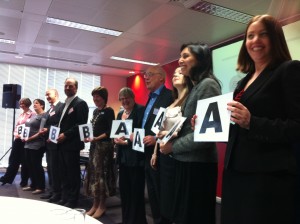It’s been an interesting couple of weeks that began with a vacation in Cabo Verde on an island called Sal (Salt in English-which sort of gives away the terrain). Then a week in Lisboa at the annual SocialNow event, a unique gathering where social enterprise software vendors present their products to an invited evaluation panel representing the management of a fictituous company Cablinc.
a book on the sunbed
Cabo Verde was chosen as the vacation destination for two reasons: it is a former Portuguese colony and my wife (who is Portuguese) and I are trying to visit all of them to see how much of the culture and governance structures remain; and it seemed like a good place to wind down and catch up on book reading.
Without the necessity of a daily commute and the reading time a long journey creates I find the virtual world gets in the way of paperback reading though sitting under a sun umbrella reading a book on KM Strategy might not be everyone’s idea of relaxation on vacation!
Here’s a very abdriged review of my vacation reading list:
- The Kind Worth Killing: A clever tale, well written with a twist that starts at an airport, the author keeps you
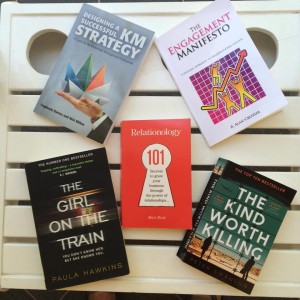 in constant anticipation and it kept my interest throughout. Great for a 5 hour plane ride.
in constant anticipation and it kept my interest throughout. Great for a 5 hour plane ride. - The Girl On The Train: Took a long time to get going (rather like the train system here) switching back and forth among characters. Ending was well crafted if you have the patience to get there.
- Relationology: Essentially a business book (101 tips) about managing relationships with stakeholders. Admired the discipline behind the networking approach and how the author has turned his theories into practice for the good of others but felt it devalued the human element of meeting people by making it a very structured process. Did like suggestions about having groups of mailing lists and being upfront about why you are meeting/calling.
- Engagement Manifesto: A book that triggered a lot of thought with good tips and approaches. Made the most notes (7 c’s of change, 5 elements of change and ‘The Five Monkeys’ experiment about resistance to change as its “the way things are done around here’).
- Knowledge Management (KM) Strategy: The book sets out a good, structured and thorough approach and I liked the suggestion that organisations should give primary focus on critical knowledge and strategic knowledge areas when developing their strategy. I felt though the chapter on KM Technology could have benefited from more visualisation of where the tools fit and what they look like (a picture being worth a thousand words).
KM Manager’s 4 critical ‘ates
While reading the Engagement Manifesto with its 4 of this and 7 of that my thoughts turned to engagement in a KM environment. I’ve been arguing for some time that facilitation is a core competence for all KM Managers. And I think there are 3 others. So my 4 critical ‘ates are:
- Investigate: Are you putting a buring fire out / solving an immediate business need (operational KM) or is this driven by the vision from the top consisent with the organisation’s stated business direction (Strategic KM)?
- Negotiate: Up front you need to agree what the scope of your role is and to be tough negotiating what success and hence measures will look like.
- Facilitate: So much of what a KM Manager does involves facilitation and another sub ‘ate, Navigate. You will become the hub knowing who to go to to ask if you don’t know yourself. You have to facilitate connections, meetings, interactions, events and communities. It requires resilinace and a lot of social skills.
- Communicate: Senior KM’er’s tell you to devote at least 30% of their time to communicating what you do and getting feedback – its not just about broadcasting it’s about collaborating. Have the KM Elevator pitch always with you. Let all your stakeholders know what you are doing and why.
Which leads me nicely onto Lisboa and the 5th edition of SocialNow.
getting Social in Lisboa

From left, Luis Suarez, Emanuele Quintarelli, Paul Corney, Ana Neves, Jaap Linssen and Marc Wright
5 vendors presented and they were interwoven with a couple of keynotes and presentation from Cablinc ‘consultants’ (see panel alongside) who focused on the business issues facing the organisation setting context for the vendor presentations. I was delighted that Eric Hunter was able to come over from San Diego to sit on the evaluation panel.
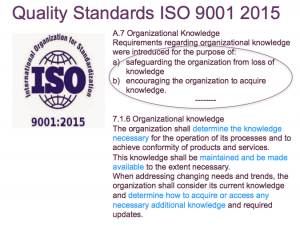
My topic was Knowledge Capture & Retention and ISO 2015. Perhaps surprisingly few in the room were aware of last year’s ISO update which for the first time included this on KM:
A fuller account of the proceedings and the twitter chat can be found at eventifer.
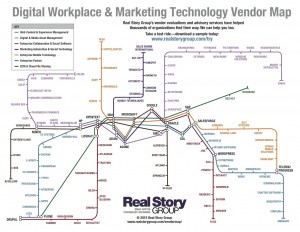 I was really taken by the closing Keynote from Tony Byrne of The Realy Story Group who gave an illuminating talk on the landscape of digital workplace and social enterprise tools and apps. His Technology Vendors Map is well worth a look.
I was really taken by the closing Keynote from Tony Byrne of The Realy Story Group who gave an illuminating talk on the landscape of digital workplace and social enterprise tools and apps. His Technology Vendors Map is well worth a look.
If this is a topic of interest I’d also point you to an excellent article from Dion HInchcliffe on Social Collaboration Tools.
As in 2015 Nooq won the ‘coolest tool’ category. Its a great visualisation tool to show what’s happening in an organisation and sits above enterprise applications.
and finally
This year for the first time there was a day of Masterclasses after the event. I was delighted to have had the opportunity to work alongside Luis Suarez (@elsua) who is a #noemail evangelist.
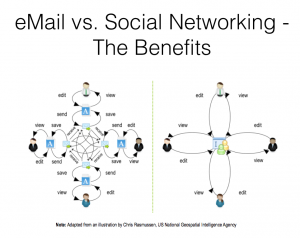 Luis ran the morning and I ran the afternoon. His method and justification for lowering email usage are compelling and I loved this slide that shows how a social networking platform can be a lot more efficient than using email.
Luis ran the morning and I ran the afternoon. His method and justification for lowering email usage are compelling and I loved this slide that shows how a social networking platform can be a lot more efficient than using email.
And now back in the UK I have a couple of week’s focusing on the next chapter of the book I am coauthoring with Patricia Eng before travelling back to the Mid East and Lisboa.

